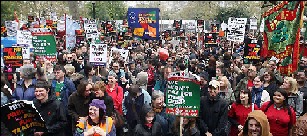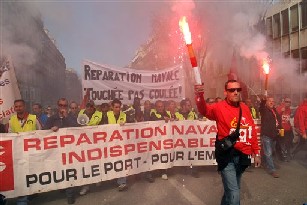IN HIS INTRODUCTION to the Winter 1998 New Politics symposium (Vol. VI, No. 4) marking the 150th anniversary of The Communist Manifesto, Julius Jacobson, co-editor and co-founder of this journal, noted that “symptomatic of the crisis in Marxism” is not only the “failure of the working class to act as the agency for social transformation but the changing nature of the working class itself which is a legitimate area of concern and debate” (p. 47). This special section renews the challenge that New Politics symposium set out, of understanding what has happened to the working class and labor unions internationally, and how they have — and have not — responded to the greatest financial crisis in capitalism we have witnessed in generations. All of the authors are activists in the labor movements in their respective countries. We asked them to describe and analyze how workers in their countries are responding to the world economic crisis, noting what they see as the role of the revolutionary socialist left in all of this, if it has a role, and describing the prospects. Their essays reflect the great differences in political life, social class relations, and union organization in various nations. We anticipate that two additional contributions will be posted on our website (www.newpol.org) by the time the print edition is in your hands. We intend this as the beginning of an ongoing discussion in New Politics and invite readers’ submissions on the subject. DAN LA BOTZ and LOIS WEINER
The World Economic Crisis: Labor's Response
In this symposium:
The Global Crisis and the World Labor Movement

THE WORLD’S WORKING PEOPLE FACE the greatest challenge in three generations. The economic crisis that began in the banking institutions of the United States last year has rapidly spread around the globe, creating a financial and industrial disaster. In one country after another banks have failed, corporations have gone bankrupt, and millions around the world have lost their jobs.
China: End of a Model…Or the Birth of a New One?
CHINA’S THIRTY YEARS OF NEARLY UNINTERRUPTED HIGH GROWTH has encountered great challenge as the global economic crisis has hit China’s export hard. Since China’s trade as a percentage of GDP is as high as 70 percent, the export-led growth mode has practically ended. The Chinese Communist Party (CCP) is aware of this. Back in April, 2008 President Hu Jintao spoke of the need to change the mode of development from export-led growth to domestic-led growth by expanding domestic demand.
Are U.S. Unions Ready for the Challenge of a New Period?
BY NOW IT SEEMS CLEAR that the United States has entered a new period of contradictory trends that presents a profound challenge to organized labor. First there is the deepening world recession that is bringing down some of American capitalism’s most high profile institutions from Wall Street to Detroit. At the same time, of course, it is wiping out millions of jobs, 4.4 million from December 2007 to February 2009.
French Workers Face the Crisis
 TRANSLATED BY MICHAEL SEITZ GUADELOUPE HAS MADE AN IMPRESSION . . . but not yet on the French union movement. The capitalist crisis affects France as it does all industrialized countries.The ingredients are the same:
TRANSLATED BY MICHAEL SEITZ GUADELOUPE HAS MADE AN IMPRESSION . . . but not yet on the French union movement. The capitalist crisis affects France as it does all industrialized countries.The ingredients are the same:
The Class Struggle in Post-Soviet Russia
TRANSLATED BY MICHEL VALE THE RESTORATION OF CAPITALISM on the territory of the former Soviet Union was accompanied not only by unprecedented attacks on the social rights of the population. (Not only rights characteristic of the Soviet system, e.g., the right to housing, were rescinded, but also many of those that in the West are considered a normal attribute of a civilized attitude toward the wage laborer). No less impressive was the ease with which the new bourgeoisie imposed its conditions on the workers. By the late eighties the topic of free trade unions had become extremely popular.
Notes Toward a Vision of The Workers' Movement in Mexico
TRANSLATED BY DAN LA BOTZ To the memory of Dale Hathaway and Antonioin Villalba IN ORDER TO EVALUATE AND UNDERSTAND the current situation of the workers’ movement in Mexico as power has shifted from the Institutional Revolutionary Party (PRI) to the National Action Party (PAN), it is important to understand the character of the Mexican regime and its historical development. Does a change in the ruling party represent the beginning of a democratic transition and a change in the system?


Leave a Reply